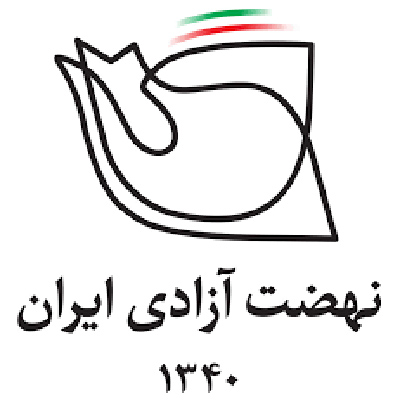Groups, Institutions, Organiza
The Freedom Movement of Iran(In Persian Nahżat-e āzādi-e Irān)
Written by: Sajjad Naderipour,
Translated by: Hadi Qorbanyar
14 دورہ
The Freedom Movement of Iran took ambiguous positions over the Iran–Iraq War. On May 15, 1961, the Freedom Movement of Iran was founded following a split between Mahdi Bazargan and Yadollah Sahabi on one side and the central council of the National Front of Iran[1] on the other. The official announcement of its existence came two days later, on May 17th.[2]
Early figures in the Movement included Ayatollah Seyyed Mahmoud Taleqani, Mansour Ataei, Seyyed Reza Zanjani, Hassan Nazih, Rahim Ataei, and Abbas Samiei.[3]
Before the Islamic Revolution, the Freedom Movement of Iran had only one year of active public engagement. It issued a statement criticizing the White Revolution, which led to the arrest of its leaders and effectively suspension of its activities until 1977–1978.[4]
After the Revolution, at the suggestion of the Islamic Revolutionary Council, Imam Khomeini (ra) appointed Mahdi Bazargan as the Prime Minister of the interim government.[5] As a result, many government posts were filled by members of the Freedom Movement. However, fundamental ideological differences between the Freedom Movement and Imam Khomeini’s movement led to Bazargan’s resignation after the takeover of the U.S. Embassy on November 4, 1979.[6]
Following the interim government’s resignation, the Freedom Movement formed a coalition and nominated 15 candidates for Iran’s first parliamentary elections[7] of whom Mahdi Bazargan, Yadollah Sahabi, Ahmad Sadr Haj-Seyyed-Javadi, Ebrahim Yazdi, and Hashem Sabaghian won seats.[8]
Two weeks after the Iran–Iraq War began, the Freedom Movement issued a statement labeling Iraq’s attack “imposed” and suggesting that promising phases of victory were approaching in the “inevitable and imposed fight against the Baghdad regime”. The statement also blamed some domestic factors for provoking the invasion — in particular, a prevailing revolutionary mindset among some leaders and activists that the Revolution should be exported. The movement called this attitude a “revolutionary fantasy”. According to the Freedom Movement, many revolutionary leaders believed that if Iran failed to project the Revolution’s momentum beyond its borders, hostile states would seize the opportunity to undermine both the country and the Revolution itself. As the Movement leadership claimed, they also thought that it was necessary to target American interests wherever possible, arguing that without such actions, the revolutionary fervor would fade. For the Freedom Movement, Bazargan’s interim government pursued the correct diplomatic measures to prevent war without compromising principles, but revolutionary leaders and activists undermined those efforts and blocked the government’s attempts to avoid conflict.[9]
On September 21, 1981, the Freedom Movement of Iran issued a statement acknowledging the growing resilience of the Iranian Army, the Islamic Revolutionary Guard Corps (IRGC), and the nation after a year of war. Emphasizing the need to continue the fight until victory, the statement expressed hope that “this war will end favorably, with the complete success of Iran and the definite defeat of Saddam’s forces”. At the time, the Freedom Movement also sent an open letter to Hojatoleslam Akbar Hashemi Rafsanjani, then Speaker of the Islamic Consultative Assembly, stating: “In this imposed war, we recognize no path other than defense, sacrifice, and victorious resistance”.[10]
However, after the liberation of Khorramshahr on May 24, 1982, and amid preparations for retaliatory attacks against the aggressor, Mahdi Bazargan privately wrote to Imam Khomeini (ra) requesting the initiation of peace negotiations with Iraq, which was rejected.[11] From Khorramshahr’s liberation until Iran’s acceptance of UN Resolution 598 in 1988, the Freedom Movement officials repeatedly voiced their opposition to continuing the war through meetings with government officials, public statements, resolutions, and parliamentary speeches.
After Operation Ramazan (1982), the Freedom Movement announced that continuing the war was illegitimate. Early in 1983, Bazargan argued that exporting the Revolution had been the main cause of the war, framing Iraq’s attack as a preemptive move. In the same year, the Fifth National Congress of the Freedom Movement reaffirmed its stance that the war should have ended following the liberation of Khorramshahr.
On the fifth anniversary of the Revolution in February 1984, Mahdi Bazargan publicly condemned the ongoing war, arguing that it served the interests of the United States and other global powers, contradicted Islamic and national values, and impeded Iran’s development.[12]
In spring 1985, the final resolution of the Sixth Congress of the Freedom Movement emphasized that “prolonging the war contradicted God’s Will and undermined the ideals of the Revolution, Iran and Islam”. The statement placed full blame on those responsible for extending the conflict. In summer 1958, the Freedom Movement published a pamphlet titled “An Analysis of War and Peace”, arguing that the war was avoidable and attributing its cause to the propaganda and decisions of the governing body of the Islamic Republic. They also described the war as a pretext to avoid implementing constitutional principles. Moreover, on March 16, 1985, in a statement titled “Who is to Blame?”, the Movement addressed the people as “fellow citizens afflicted by the disaster”, warning that the continuation of the war would lead to “the country’s destruction and the complete success of Israel and the superpowers”. In addition, 60 members of the Freedom Movement sent a telegram to the UN Secretary-General, referencing attacks on residential areas by both sides—without specifying the aggressor—and urged the UN “to ensure that all parties comply with international obligations and to use all efforts to bring this destructive war to a fair and honorable end”.[13]
On May 1, 1985, Mahdi Bazargan, in an interview with BBC Persian, stated that the only beneficiaries of the war were the superpowers, arms dealers, and both Iran and Iraq. He stressed the importance of Iran entering peace negotiations with Iraq, asserting that Iraq had initiated the conflict and should therefore be held accountable through war reparations. In an interview with the French newspaper Le Monde, he also said: “According to the teachings of the Holy Quran and the sayings of the Prophet Muhammad (pbuh), one should negotiate with the enemy to resolve the war. In our view, continuing this war cannot bring any benefit to the people of Iran and Iraq. No effort should be spared to end this war justly and honorably”. Likewise, on April 7, 1985, the Freedom Movement of Iran issued a statement calling for the immediate ending of the war. Interpreting Imam Khomeini’s remark that “war will be fought until sedition is removed from the world” as a call for spreading war beyond Iraq, effectively against the whole world, the statement criticized his view. It asserted that if the aggressor initiates a call for peace, the leader of the Muslims should accept it.
On June 12, 1985, Bazargan, in an interview with the American newspaper Christian Science Monitor, said that continuing the war with Iraq was against Iran’s economic, political, and military interests. He announced his intention to run in the presidential elections and promised that if elected, he would end the war. “As long as Iraqi soldiers were in Iranian territory, it was our Islamic duty to expel them; but in the summer of 1982, our soldiers entered Iraqi territory, an action which went against the Islamic principles”, he added.
The seventh clause of the Freedom Movement of Iran’s 1986 Eighth Congress resolution attributed the outbreak of the Iran–Iraq War to instigation by the Americans and Zionist Regime. It also emphasized that “defending national sovereignty and independence, the mobilization of forces, and persistent diplomatic efforts to defeat the enemy” were necessary. However, it stated that continuing the war served the interests of superpowers, Zionism and was harmful to both Muslim nations of Iran and Iraq. The resolution outlined the Freedom Movement’s proposals for “fair conditions to end the war” as follows: “Iraq, as the initiator of the war, should be condemned by the United Nations; an internationally accepted expert commission should determine the damages and losses; Iraq should pay reparations to Iran; all prisoners of war should be released; a temporary buffer zone inside Iraqi territory should be created under the supervision of UN peacekeeping forces, with Iranian forces withdrawing to positions behind pre-war borders and Iraqi troops retreating behind the buffer zone”.[14]
On September 6, 1986, the Freedom Movement sent an open letter to Imam Khomeini (ra) titled “Those Ignorant of Quran Have Taken Power”, in which his statements on continuing the war until the removal of sedition worldwide were described as “engaging in the war until destruction”. The letter even rejected Imam Khomeini’s remark that “the war must continue to the point of martyrdom and meeting God”, thereby raising doubt on the concept of martyrdom.
On February 3, 1987, the Freedom Movement of Iran sent a telegram to the UN Secretary-General condemning the bombing of cities and once again voicing its opposition to Iran’s policy of prolonging the war. The message emphasized that ending the conflict “justly and honorably” would serve the best interests of both the Iranian and Iraqi people.[15] Article 15 of the Freedom Movement of Iran’s Ninth Congress resolution in 1987 reaffirmed the group’s opposition to the continuation of the Iran-Iraq War. This article, titled “The Necessity of Ending the War”, reflected the Movement’s consistent stance throughout the conflict that “the war, which had begun with defensible aims, had by then lost its legitimacy and was causing widespread destruction and suffering. It overshadows all political, social, and economic matters, and the Movement sees the nation’s interests, the country’s welfare, and the satisfaction of both God and the people in its just and honorable conclusion”.
On May 9, 1987, Mahdi Bazargan, in an article published in the Kuwaiti newspaper Al-Qabas, wrote: “This war provided Israel with an opportunity to achieve its long-term strategic objectives in Iran and to act to eliminate or at least reduce the threats that it might face in the future”.[16]
By early 1988, on the occasion of the New Iranian Year, the Freedom Movement printed and distributed a greeting card stating: “In the past year, the drum of war was constantly beaten, and despite the country’s interests, bloodshed and destruction continued. Our youth perished in an unwanted war whose end is unclear, and more families mourned their loved ones”. After the acceptance of UN Resolution 598, the Movement issued a statement noting: “Although the interests of our country are not fully secured through this resolution, preventing further harm is, in itself, beneficial”.[17]
Despite a 2002 court ruling ordering its dissolution,[18] the Freedom Movement remains an active political party. Currently, Hashem Sabaghian, Muhammad Tavassoli, Abolfazl Bazargan, Muhammad Hussain Bani-Asadi, Seyyed Ali-Asghar Gharavi, Ghaffar Farzadi, Khosrow Mansourian, and Emad Bahavar are active members of the Freedom Movement of Iran.[19]
[1] Soltani, Mojtaba, Nehzate Azadi Iran 1340-1396 (The Freedom Movement of Iran 1961–2017), Tehran, Moasseseye Motaleat va Pazhuhesh-haye Siyasi, 1398, Pp. 66–67.
[2] Ibid., p. 15.
[3] Ibid.
[4] Ibid., p. 114.
[5] Moasseseye Tanzim va Nashr-e Asar-e Imam Khomeini, Sahifeh-ye Imam (An Anthology of Imam Khomeini’s Speeches, Messages, Interviews, Decrees, Religious Permissions, and Letters), Vol. 6, Tehran, 1378, Pp. 54–55.
[6] Moasseseye Tanzim va Nashr-e Asar-e Imam Khomeini, Ibid., Vol. 10, p. 500.
[7] Bazkhaani Entekhabat-e Nokhostin Dore-ye Majles-e Shoraye Eslami (Review of the First Term Elections of the Islamic Consultative Assembly) https://irdc.ir/fa/news/5621/
[8] Soorat-e Asami Namayandegan-e Dore-ye Aval Majles-e Shoraye Eslami (The List of Representatives from the First Term of the Islamic Consultative Assembly), Namayandegan/Dore-Aval, https://www.parliran.ir/
[9] Yekta, Hussain, Sotoun-e Panjom ya Dovomin Do Rahi/Negahi be Mavaze va Amalkard-e Nehzate Azadi Iran dar Mored-e Jang-e Iran va Araq (Fifth Column or Second Crossroad: A Look at the Positions and Actions of the Freedom Movement of Iran regarding the Iran-Iraq War), Faslnameh-ye Zamaneh, No. 26, 1383, p. 56.
[10] Ibid.
[11] Ibid.
[12] Ibid., p. 57.
[13] Ibid.
[14] Ibid.
[15] Ibid., Pp. 57–58.
[16] Ibid. p. 58.
[17] Ibid.
[18] Soltani, Mojtaba, Ibid., p. 755.
[19] Sit-e Nehzate Azadi Iran (The Freedom Movement of Iran Website), https://nehzateazadi.org



